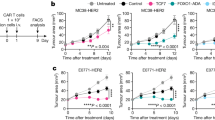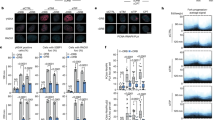Abstract
The t(15;17) rearrangement found in acute promyelocytic leukemia (APL) yields a fusion transcript, PML/RARα. PML/RARα expression is linked to leukemogenesis and to clinical sensitivity to all-trans retinoic acid (RA). Paradoxically, RA treatment causes transient complete remissions in most t(15;17) APL cases. The precise roles of PML/RARα in triggering leukemia or in causing a maturation block are not yet known. This study explores directly these PML/RARα functions in the growth and differentiation of APL cells using a hammerhead ribozyme to target PML/RARα mRNA in the NB4 APL cell line. When the PML/RARα cleaving but not the non-catalytic control ribozyme is introduced into the NB4 APL cell line, PML/RARα protein expression is reduced. This catalysis signals growth suppression, cytotoxicity, and apoptosis without overcoming the maturation block found in these leukemic cells. These biologic effects depend on the selective pressure used to express the ribozyme from an episomal vector. Introduction of a non-catalytic, control ribozyme into NB4 cells caused no observed phenotype due to anti-sense activities. Expression of the catalytic or non-catalytic ribozymes in control cells lacking PML/RARα mRNA yielded no apparent growth or differentiation effects. Thus, use of a hammerhead ribozyme that targets PML/RARα expression in APL cells reveals the anti-apoptotic function of this translocation product and demonstrates that PML/RARα cleavage is insufficient to overcome the differentiation block observed in these leukemic cells. Taken together, these findings indicate that persistent PML/RARα expression is required to maintain basal leukemic cell growth and point to the therapeutic potential of targeting PML/RARα in APL.
This is a preview of subscription content, access via your institution
Access options
Subscribe to this journal
Receive 50 print issues and online access
$259.00 per year
only $5.18 per issue
Buy this article
- Purchase on Springer Link
- Instant access to full article PDF
Prices may be subject to local taxes which are calculated during checkout
Similar content being viewed by others
Author information
Authors and Affiliations
Rights and permissions
About this article
Cite this article
Nason-Burchenal, K., Takle, G., Pace, U. et al. Targeting the PML/RARα translocation product triggers apoptosis in promyelocytic leukemia cells. Oncogene 17, 1759–1768 (1998). https://doi.org/10.1038/sj.onc.1202075
Received:
Revised:
Accepted:
Published:
Issue Date:
DOI: https://doi.org/10.1038/sj.onc.1202075
Keywords
This article is cited by
-
Glutathione depletion overcomes resistance to arsenic trioxide in arsenic-resistant cell lines
Leukemia (2003)
-
Retinoid target genes in acute promyelocytic leukemia
Leukemia (2003)
-
Retinoids in cancer therapy and chemoprevention: promise meets resistance
Oncogene (2003)
-
Ambivalent role of BCL6 in cell survival and transformation
Oncogene (2003)
-
Common themes in the pathogenesis of acute myeloid leukemia
Oncogene (2001)



